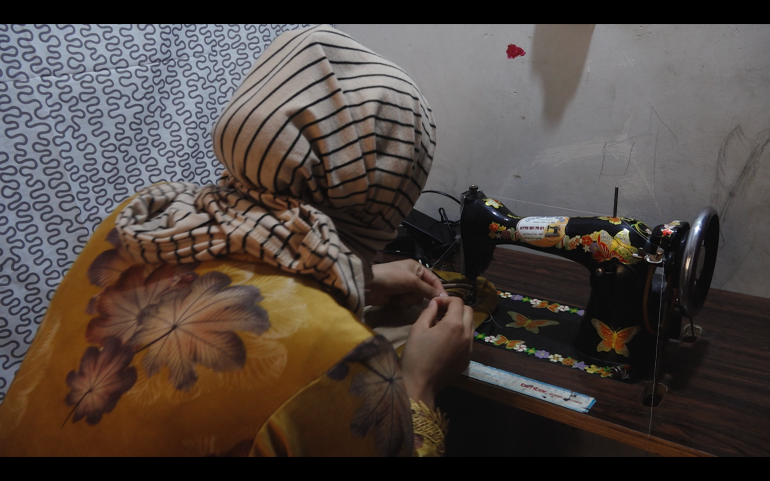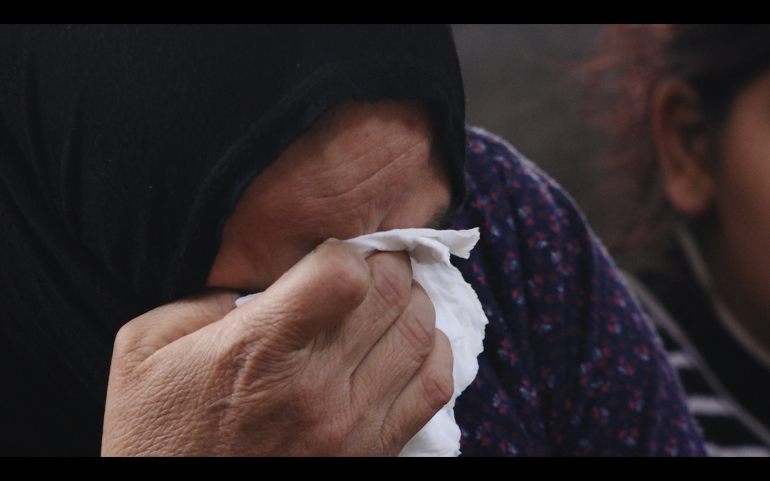‘No one cares’: ISIL’s ‘invisible’ victims
Non-Yazidi women who were abducted and raped say they have been rejected by their families and abandoned by their government.

Umm Diya* clasps her hands together as we sit down, physically perturbed to be discussing something so painful – and to be recounting her story to men once again.
Old sofas and thin mattresses fill the room in this shelter in northern Iraq. It is currently home to a small number of women who, between 2014 and 2017, were abducted, tortured and raped by members of ISIL (ISIS) when the group controlled this area.
Keep reading
list of 4 itemsNigeria’s women drivers rally together to navigate male-dominated industry
Members of London’s Garrick Club vote to let women join for first time
Why has Australia declared a ‘national crisis’ over violence against women?
These women call themselves ISIL’s invisible victims – both because their families and communities have rejected them and because they are not included in the Yazidi Survivors Law, passed by the Iraqi parliament in March 2021.
This law recognises acts of genocide and crimes against humanity perpetrated by ISIL against the Yazidi, Christian, Turkmen and Shabak minorities and provides for reparations for, among others, women and girls subjected to sexual violence.
But the women in this shelter are not from a minority. They are Shia and Sunni Muslim Arabs and the law does not apply to them.
Although Umm Diya was abducted, abused and sexually assaulted by members of ISIL and now struggles to care for her three children, aged 13, 10 and 7, she is not eligible for the assistance – including a monthly salary, a plot of land or housing unit and access to psychosocial and other health services – provided for in the law.
“ISIL kept us in a house with my kids, there were other women too,” she explains. “Our torture began there.”
Umm Diya says she begged them not to touch her children. But she could not stop them from witnessing the abuse she and the other women endured.
“They started unclothing us and beating us. We were tied by our legs to the ceiling fan, and they beat us with sticks and also lashed us, calling us the most abusive words, calling us prostitutes.”
She says many men participated in the abuse, moving from one woman to another as they beat and raped them.
“We were shouting Allah Akbar, but despite that they [continued],” she says.
Now, she explains, the trauma of what she witnessed has caused her 13-year-old daughter to lose the ability to speak. “My daughter listens to you but never speaks,” she says.
Umm Diya believes her daughter needs treatment but she cannot afford it.

‘My husband spat on me’
Like the other women at this shelter in a dilapidated old complex, Umm Diya survived ISIL but then faced further abuse at the hands of her family and tribe.
“They have this belief if you have been raped you are an ISIL woman,” explains a female aid worker who I have asked to sit with Umm Diya as she shares her story, thinking that having a woman present might make her feel more comfortable.
When I ask Umm Diya if she received support from the women in her tribe, she looks puzzled. She explains that when the leader of her tribe declared that she was “an object of shame”, her aunts, other relatives and even childhood friends abandoned her.
“My husband spat on me and started beating me with my brother. I was beaten so bad, they had to take me to the doctor,” she says.
“My husband left me. [He said] ‘You are shame to me, I do not want you any more, you have given your body to ISIL militants,’ He left us alone.”
That is how Umm Diya and her children ended up at the shelter, which has supported 14 women since it opened last year. Some of the women have left the shelter after receiving written guarantees from the leaders of their tribes that they would not be harmed. Others have returned to their family homes – where their husbands have remarried – to work as servants in the house so that they can be close to their children.
“Honour, ironically, is used as a pretext by the wider society and tribes as they dishonourably abuse their own sisters, wives and even daughters,” says Yanar Mohammed, the President of the Organization of Women’s Freedom, an NGO that runs shelters, including this one, for Yazidi and other survivors of ISIL’s crimes.
‘Living in the shadows’
Much of the support Yanar and her team of volunteers and staff provide to the women must be done secretly because of the threats these survivors face from within their own families and communities. All the women they work with, she says, face societal challenges. But while the crimes ISIL committed against Yazidi women are widely recognised within and beyond Iraq, she says non-Yazidi victims have been largely ignored and abandoned.
“Muslim Arab women who were enslaved by ISIL did not find a place to go back to, they are still living in the shadows of the society with nobody who acknowledges them, respects them,” Yanar explains.
Most did not disclose what they had endured to anybody she says, adding: “She lived with her pain or she died with her pain. Many of them turned into dead bodies just buried in the back yard of ISIL fighters.”

She estimates that no fewer than 10,000 women were victims of ISIL but says this has not been “acknowledged by the international community or dealt with in a way that keeps the dignity, the respect or [provides] compensation for most victims”.
More than 6,000 Yazidi women and children are thought to have been abducted and enslaved by ISIL, but the number of non-Yazidi women and children is not known – in part because of the stigma associated with it.
Thrown into the well
Every woman and girl at the shelter has a tragic tale of violence and abandonment. Hazeen* is 16 years old. She was a child when ISIL took her and her mother.
“My life was destroyed,” she says.
“One day they came up to us and told us they had killed my father.”
She says the men keeping them captive tried to marry her to an ISIL fighter but her mother refused.
She recounts how her mother told them: “Do whatever you want to do to me but leave my daughter alone.”
Then, she says: “They raped my mother in front of me and later they raped me in front of her.”
Her mother, who is sitting beside her, breaks down.
“The other women captured by ISIL where I was kept were all Sunni Muslims,” Hazeen’s mother explains. “Probably hundreds were physically abused. Those who resisted were killed and thrown into wells. The worst thing I saw was a child, wearing diapers, who was killed and thrown into the well,” she adds, wiping her tears with the tissue she has been clutching as the other women in the room try to console her.

Yanar says she and her team have been recording hundreds of testimonies from Yazidi and non-Yazidi women about the abuse they endured, but that societal challenges and government apathy lead to inaction.
“Our main ordeal is that the Yazidi Survivors Law, which stipulates how reparations from the government should work and also compensate the victims, is not inclusive. Those who were enslaved and abused are equally eligible. We do not know what is the reason for this? Is it because the community does not reclaim the dignity of these women? Or is it because the government is under some sectarian pressure and it doesn’t want to acknowledge that these women were enslaved by ISIL,” she asks.
“There is a lot of work that needs to be done by the international community so the government treats all of these survivors as prisoners of war,” Yanar adds.
I ask Umm Diya if she sees how it could be difficult to corroborate her story and that some say it is hard to establish with certainty who helped ISIL and who was a victim of the group, she is disgusted.
In fact, she accuses the government of sheltering some women who were part of ISIL, just because they got the endorsement of the leaders of their tribes.
Al Jazeera has not been able to corroborate her account of what happened to Umm Diya, but she filed a case in court, which included witness accounts.
“I told them I was raped by ISIL militants, it was back in 2017 and until now, I’ve received nothing. No reparation, nothing,” she says, looking down as she tries to hold back her tears. There is a long and heavy silence in the room.
As we get up to leave, the women thank us for listening to them. I assure them we will tell the world about their ordeal.
Umm Diya smiles sadly: “No one cares.”
*Names changed to protect their identities